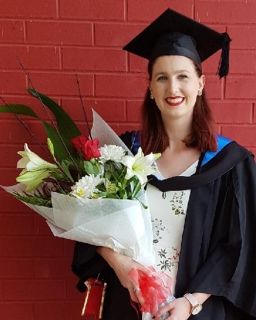Georgia
It took me a long time, but you'll get there and it'll be worth it in the end. Don't give up.
University has been a long road with many twists and turns for Georgia Johnston.
“I think I’ve done uni every single way you can do uni,” says Georgia. “I was part-time, I deferred, I went full time. I changed degrees.”
She persevered. Now, not only will Georgia be graduating with her Bachelor of Arts (Honours) Linguistics in December, she’ll be taking up a job in her chosen field of forensic linguistics. She’ll also be graduating having made a major contribution to forensic linguistics through her Honours thesis.
“Forensic linguistics covers text and audio and is basically the analysis of evidence for criminal activity,” Georgia explains.
A common case would be comparing a sample of a suspect’s voice to samples from the known offender and calculating the probability that they’re the same person based on features of their voices.
Georgia conducted a similar analysis of 500 samples from a database during her research.
“I was looking at pitch in male Australian English speakers, which hadn’t been done before,” she says. “Pitch has been more accepted as a qualitative measure rather than a quantitative one.”
“A qualitative measure is based more upon educated opinion. It's still definitely a very reliable source, but it hadn't been tested in a more empirical way, using a more scientific method.”
Her proof of concept research has given testing for pitch the quantitative green light.
“I hope that when people read my thesis, they will be able to go, ‘Yes: I can scientifically and reliably present my evidence based on this paper’.”
Prior to coming to ANU, Georgia hadn’t heard of linguistics. She’d done sciences and languages in college, and it wasn’t until she took some obligatory linguistics courses as part of her Bachelor of Languages that a match for her dual passions was made.
“You’re applying all these scientific methods to language with applied linguistics,” she says.
“I realised that this is literally the perfect field for me to be in. And then when I did Dr Shunichi Ishihara’s advanced forensic linguistics course, I was like: This is it – this is what I want to do.”
The idea of contributing and being a part of the justice process through her work also appealed to Georgia. Forensic linguistics is used in solving crimes such as murder and fraud, to determining infringement of copyright and clarity of language.
“For example, people claiming workplace incidents,” Georgia says. “A company might say, ‘No, we had a warning for that, this is the warning’ and we’d go through it as linguists and assess whether it was really understandable or if it too ambiguous.”
During her studies, Georgia did some work for one of her lecturers, Dr Paul Sidwell, who runs the business Language Intelligence. After she graduates, she’ll be a consultant there.
“That's what ANU can give you – networking and the ability to make connections with academics and people who work in industry that you can have access to,” she says.
Georgia’s six year odyssey at ANU is coming to a close, and she admits that it’s taken her a bit longer than most to finish.
“I know a couple of people who are younger than me at my retail job, and I say to them, ‘It's okay, you will get there’,” she says.
“’It took me a long time, but you'll get there and it'll be worth it in the end. Don't give up’.”

Degree
Bachelor of Arts (Honours) Linguistics
Majors & Minors
Linguistics
